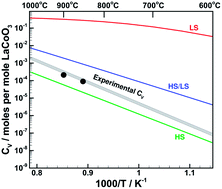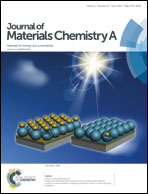Ab initio DFT+U analysis of oxygen transport in LaCoO3: the effect of Co3+ magnetic states†
Abstract
Although solid oxide fuel cells (SOFCs) provide clean and efficient electricity generation, high operating temperatures (T > 800 °C) limit their widespread use. Lowering operating temperatures (600 °C < T < 800 °C) requires developing next-generation mixed ion-electron conducting (MIEC) cathodes that permit facile oxygen transport. One promising MIEC material, La1−xSrxCo1−yFeyO3 (LSCF), can operate at intermediate temperatures, has a longer cell lifetime, and permits less expensive interconnect materials. However, the road to optimization of LSCF compositions for SOFC applications would benefit from fundamental, atomic-scale insight into how local chemical changes affect its oxygen ion conductivity. We provide this insight using ab initio density functional theory plus U (DFT+U) calculations to analyze the factors governing oxygen transport in the LSCF parent material LaCoO3. We show that oxygen diffusion in LaCoO3 depends strongly on the spin state of the Co3+ ions: in particular, low spin Co3+ promotes higher oxygen vacancy concentrations than other spin states. We also predict that different spin states of Co3+ significantly affect the oxygen ion migration barrier. Through electronic structure analysis, we uncover the fundamental details which govern oxygen diffusivity in LaCoO3.


 Please wait while we load your content...
Please wait while we load your content...